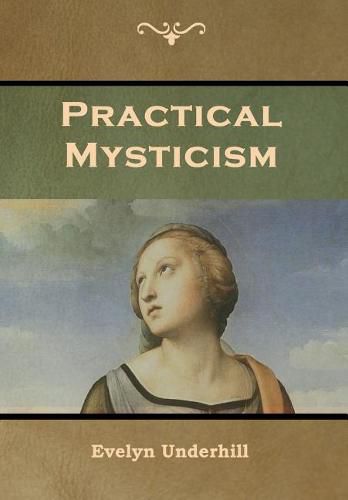Readings Newsletter
Become a Readings Member to make your shopping experience even easier.
Sign in or sign up for free!
You’re not far away from qualifying for FREE standard shipping within Australia
You’ve qualified for FREE standard shipping within Australia
The cart is loading…






This title is printed to order. This book may have been self-published. If so, we cannot guarantee the quality of the content. In the main most books will have gone through the editing process however some may not. We therefore suggest that you be aware of this before ordering this book. If in doubt check either the author or publisher’s details as we are unable to accept any returns unless they are faulty. Please contact us if you have any questions.
Evelyn Underhill (6 December 1875 - 15 June 1941) was an English Anglo-Catholic writer and pacifist known for her numerous works on religion and spiritual practice, in particular Christian mysticism.
In the English-speaking world, she was one of the most widely read writers on such matters in the first half of the 20th century. No other book of its type–until the appearance in 1946 of Aldous Huxley’s The Perennial Philosophy–met with success to match that of her best-known work, Mysticism, published in 1911.
Underhill’s greatest book, Mysticism: A Study of the Nature and Development of Man’s Spiritual Consciousness, was published in 1911, and is distinguished by the very qualities which make it ill-suited as a straightforward textbook. The spirit of the book is romantic, engaged, and theoretical rather than historical or scientific. Underhill has little use for theoretical explanations and the traditional religious experience, formal classifications or analysis. She dismisses William James’ pioneering study, The Varieties of Religious Experience (1902), and his four marks of the mystic state (ineffability, noetic quality, transience, and passivity). James had admitted that his own constitution shut him off almost entirely from the enjoyment of mystical states, thus his treatment was purely objective. Underhill substituted (1) mysticism is practical, not theoretical, (2) mysticism is an entirely spiritual activity, (3) the business and method of mysticism is love, and (4) mysticism entails a definite psychological experience. Her insistence on the psychological approach was that it was the glamorous science of the pre-war period, offering the potential key to the secrets of human advances in intelligence, creativity, and genius, and already psychological findings were being applied in theology (i.e., William Sanday’s Christologies Ancient and Modern). (wikipedia.org)
$9.00 standard shipping within Australia
FREE standard shipping within Australia for orders over $100.00
Express & International shipping calculated at checkout
This title is printed to order. This book may have been self-published. If so, we cannot guarantee the quality of the content. In the main most books will have gone through the editing process however some may not. We therefore suggest that you be aware of this before ordering this book. If in doubt check either the author or publisher’s details as we are unable to accept any returns unless they are faulty. Please contact us if you have any questions.
Evelyn Underhill (6 December 1875 - 15 June 1941) was an English Anglo-Catholic writer and pacifist known for her numerous works on religion and spiritual practice, in particular Christian mysticism.
In the English-speaking world, she was one of the most widely read writers on such matters in the first half of the 20th century. No other book of its type–until the appearance in 1946 of Aldous Huxley’s The Perennial Philosophy–met with success to match that of her best-known work, Mysticism, published in 1911.
Underhill’s greatest book, Mysticism: A Study of the Nature and Development of Man’s Spiritual Consciousness, was published in 1911, and is distinguished by the very qualities which make it ill-suited as a straightforward textbook. The spirit of the book is romantic, engaged, and theoretical rather than historical or scientific. Underhill has little use for theoretical explanations and the traditional religious experience, formal classifications or analysis. She dismisses William James’ pioneering study, The Varieties of Religious Experience (1902), and his four marks of the mystic state (ineffability, noetic quality, transience, and passivity). James had admitted that his own constitution shut him off almost entirely from the enjoyment of mystical states, thus his treatment was purely objective. Underhill substituted (1) mysticism is practical, not theoretical, (2) mysticism is an entirely spiritual activity, (3) the business and method of mysticism is love, and (4) mysticism entails a definite psychological experience. Her insistence on the psychological approach was that it was the glamorous science of the pre-war period, offering the potential key to the secrets of human advances in intelligence, creativity, and genius, and already psychological findings were being applied in theology (i.e., William Sanday’s Christologies Ancient and Modern). (wikipedia.org)